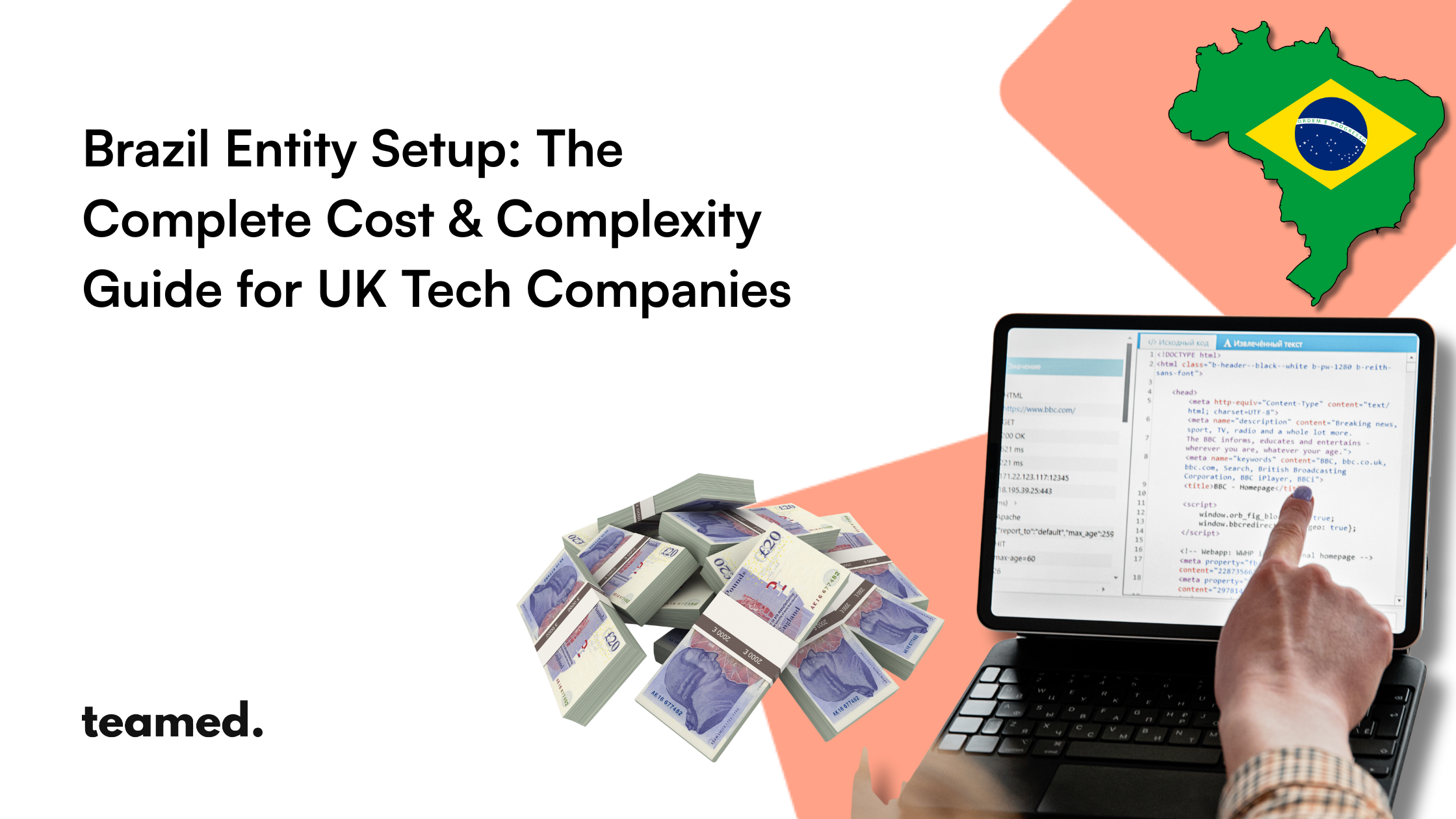Setting up a Brazilian entity can cost UK tech companies over £20,000 upfront and takes over five months to complete. The process involves navigating one of the world's most complex tax systems, appointing a resident director, and registering with multiple government agencies that each operate on different timelines.
Most UK companies underestimate the compliance burden once their entity is live. Monthly e-Social filings, quarterly tax estimates, and overlapping federal, state, and municipal levies create ongoing administrative work that can overwhelm Finance and Legal teams unprepared for Brazilian regulatory requirements.
This guide covers entity structure options, step-by-step incorporation procedures, complete cost breakdowns in GBP, tax obligations, compliance calendars, and when moving from EOR to your own subsidiary makes strategic sense.
Key Takeaways
- The incorporation process takes over five months and requires a resident director, local address, and CNPJ tax registration
- Brazil's tax system ranks among the world's most complex, with overlapping federal, state, and municipal levies
- Moving from EOR to your own entity makes financial sense once you reach 15+ employees or face client compliance requirements
- Teamed enables seamless transitions from contractor to EOR to subsidiary across 180 countries
Why UK Tech Firms Choose Brazil
Brazil offers 215 million consumers and Latin America's largest digital economy. For UK companies targeting growth beyond Europe, the country combines market scale with improving infrastructure and government procurement opportunities.
The time zone sits just three hours behind London. Morning meetings in the UK align with mid-morning in Brazil, whilst afternoon calls still catch Brazilian teams before end of day. Financial services firms value this overlap for client servicing and regulatory reporting. Defence contractors and professional services companies find it easier to coordinate secure communications during standard business hours.
Government contracts often require local entities. Without one, UK firms exclude themselves from opportunities in infrastructure, defence technology, and financial services. Brazil's Lei de Informática offers tax reductions for companies investing in local R&D, lowering effective tax burdens by 15–20% for software development activities.
Entity Options for Foreign Companies
The legal structure you choose affects liability exposure, setup complexity, and ongoing costs. Most UK tech companies select one of three paths: a private limited company (Ltda), a public corporation (S.A.), or a branch office.
Ltda Private Limited
The Sociedade Limitada (Ltda) functions like a UK private limited company. Shareholders' personal assets stay protected, with liability capped at capital contributions. This structure accounts for roughly 85% of foreign-owned Brazilian entities because it balances legal protection with manageable compliance.
You'll need at least two shareholders (which can be corporate entities). There's no mandatory minimum capital requirement, though banks typically expect £8,000–£20,000 deposited to open corporate accounts.
S.A. Public Corporation
The Sociedade Anônima (S.A.) resembles a UK public limited company. Financial services companies often choose this structure because Brazilian banking regulations effectively require it for certain licences.
The S.A. comes with substantially higher compliance costs. Annual audits, quarterly financial publications, and rigorous corporate governance requirements make this unsuitable for most tech companies unless operating in regulated sectors or planning significant capital raising.
Branch Office Registration
A branch office allows your UK parent company to operate directly in Brazil without creating a separate legal entity. This simplifies setup and reduces formation costs, but your UK parent remains fully liable for all Brazilian operations.
Professional services firms sometimes use branches for short-term projects or market testing. The liability exposure makes this unsuitable for most tech companies, particularly in defence or financial services where regulatory penalties can be substantial.
Joint Venture Structure
Joint ventures with Brazilian partners provide local market knowledge and share regulatory compliance burdens. This approach works well when entering highly regulated sectors or when your business model benefits from an established local player's distribution network.
The trade-off comes in governance complexity and exit provisions. Shareholder agreements require careful drafting to address decision-making authority, profit distribution, and buy-out mechanisms. Legal costs for properly structured joint ventures typically run £15,000–£30,000.
When an EOR No Longer Fits
Employer of Record (EOR) services offer speed and simplicity for initial market entry. Several clear triggers signal when establishing your own entity makes strategic and financial sense.
Headcount and Cost Thresholds
EOR services typically cost £400–£800 per employee monthly. Once your Brazilian team reaches 8–10 people, the annual EOR expense (£48,000–£72,000) begins exceeding the cost of running your own entity.
Your own Ltda incurs roughly £6,000–£12,000 in annual compliance costs, plus payroll processing fees of £80–£120 per employee monthly. At scale, this represents 40–60% savings compared to EOR arrangements.
Client Compliance Demands
Defence contractors and financial services firms increasingly face client due diligence requirements that EOR arrangements don't satisfy. Government procurement processes often mandate that bidders maintain direct legal entities in-country.
Professional services companies report similar pressures when pursuing enterprise clients. A UK consultancy operating through an EOR may find itself excluded from RFPs that specify local entity requirements, even when perfectly capable of delivering the work.
Audit and Permanent Establishment Risk
Tax authorities scrutinise EOR arrangements to determine whether your operations constitute a permanent establishment (PE) for Brazilian tax purposes. If auditors conclude you've created a PE, your UK parent company could face unexpected Brazilian tax liabilities.
The risk escalates when you maintain Brazilian operations for extended periods, exercise significant control over day-to-day activities, or generate substantial revenue from Brazilian clients. Establishing a proper entity eliminates this ambiguity.
Step-by-Step Incorporation Process
Setting up a Brazilian entity follows a defined sequence through multiple government agencies. Budget two to four months for complete incorporation, though expedited processes can sometimes compress this to six weeks.
1. Reserve the Company Name
Search Brazil's DREI (Department of Business Registration) system to confirm your preferred company name isn't already registered. Name availability rules prohibit duplicates and restrict certain terms, particularly those implying government affiliation. Once you've identified an available name, submit a reservation request through the local Junta Comercial (Board of Trade). The reservation typically remains valid for 30–60 days.
2. Draft Portuguese Articles
Your company's articles of association (Contrato Social) are drafted in Portuguese and specify share structure, director powers, and operational scope. Engaging a Brazilian lawyer ensures compliance with local legal requirements, even if you're fluent in Portuguese.
The articles define voting rights, profit distribution, director appointment procedures, and amendment processes. Getting these right initially avoids costly restructuring later.
3. Appoint a Resident Director
Brazilian law requires at least one company director to be a Brazilian resident—either a citizen or a foreign national with permanent residency. This director holds significant legal responsibilities and potential personal liability for certain regulatory violations.
Many UK companies initially appoint a nominee director provided by their legal firm. Whilst this solves the residency requirement, the nominee signs documents but may lack operational knowledge, creating potential compliance gaps.
4. Obtain the CNPJ Tax ID
The Cadastro Nacional da Pessoa Jurídica (CNPJ) functions as your company's tax identification number, similar to a UK company registration number. You'll need it for virtually every business activity: opening bank accounts, signing contracts, issuing invoices, and filing tax returns. Register for your CNPJ through the Receita Federal (Federal Revenue Service) website after completing your Junta Comercial registration. Processing typically takes 3–5 business days.
5. Register With the Board of Trade
File your articles of association and supporting documents with your state's Junta Comercial. Required documents include passport copies for foreign shareholders, proof of address, and notarised powers of attorney if you're not personally present. The Junta Comercial reviews submissions for compliance with commercial law requirements. Approval results in a registration certificate (Certidão Simplificada) that proves your company's legal existence.
6. Open a Local Bank Account
Brazilian banks require extensive documentation to open corporate accounts: registration certificates, articles of association, director identification, and proof of business address. The process can take 2–4 weeks even after submitting complete paperwork.
You'll deposit your initial share capital into this account. Most banks require in-person appearances by directors or properly authenticated powers of attorney, which can complicate matters for UK-based founders.
7. Enrol for INSS and FGTS
Before hiring employees, register with INSS (social security) and FGTS (employment termination fund) systems. The electronic systems (e-Social and FGTS Digital) require digital certificates and specific software. Many companies engage payroll providers to handle technical requirements rather than managing them internally.
8. Issue Your First Electronic Invoice
Brazil's electronic invoicing system (Nota Fiscal Eletrônica, or NFe) requires registration with state tax authorities and integration with approved accounting software. You cannot legally invoice clients without this capability. Setting up NFe involves obtaining digital certificates, configuring XML formats, and testing transmissions with tax authority systems.
Full Cost Breakdown in GBP
Brazilian entity formation involves both one-off setup expenses and recurring annual costs. These figures reflect typical costs for a straightforward Ltda structure serving a UK tech company with 5–15 employees.
One-Off Formation Fees
Legal fees represent your largest initial expense, typically £2,400–£4,800 depending on structure complexity and law firm rates. This covers articles drafting, regulatory filings, and coordination with government agencies. Notarisation costs vary based on document volume. Expect £40–£80 per document for notarised translations from English to Portuguese, plus £60–£120 for apostille certifications making UK documents valid in Brazil.
Mandatory Share Capital
Brazil doesn't impose a statutory minimum capital requirement for Ltda structures. However, banks typically expect to see £8,000–£20,000 deposited as initial capital to open corporate accounts. This capital transfers from abroad and registers with the Central Bank as foreign direct investment. Currency conversion timing affects the amount in Brazilian reais, and transfer fees run 1–3%.
Annual Accounting and Legal
Monthly accounting services cost £400–£700 depending on transaction volume and complexity. This covers bookkeeping, monthly tax return preparation, payroll processing support, and regulatory filing management. Annual financial statements require preparation by qualified accountants and, for larger entities, external audit. Budget an additional £2,400–£4,800 annually for audit fees if your revenue or asset base triggers mandatory audit requirements.
Payroll and Social Charges
Employer costs in Brazil extend well beyond gross salaries. Total employment costs typically run 80–100% above base salary when including mandatory contributions, benefits, and statutory provisions. For a software developer earning £24,000 annually, expect total employment costs of £43,200–£48,000 including INSS contributions (20%), FGTS deposits (8%), holiday provisions (33%), and mandatory 13th-month salary payments.
Brazilian Corporate Taxes and Payroll Charges
Brazil's tax system consistently ranks among the world's most complex, with overlapping federal, state, and municipal levies. Tech companies face a particularly intricate landscape when licensing software or providing technical services.
Corporate Income Tax
The IRPJ (Imposto de Renda da Pessoa Jurídica) applies at 15% on taxable profits up to £48,000 annually, with an additional 10% surcharge on profits exceeding this threshold. Most companies calculate tax using the presumed profit method (Lucro Presumido), which applies rates to gross revenue rather than actual profits. For software companies, the presumed profit margin is typically 32% of revenue. This means effective tax rates of roughly 4.8% on gross revenue for companies below the surcharge threshold, rising to 8% for higher earners.
PIS and COFINS on Software
PIS (Programme for Social Integration) and COFINS (Contribution for Social Security Financing) are social contribution taxes levied on gross revenue. Standard rates are 0.65% (PIS) and 3% (COFINS), though software licensing may qualify for reduced rates under certain circumstances. The taxes apply regardless of profitability, affecting cash flow even during loss-making periods.
CIDE Levies on Technical Services
The CIDE (Contribution for Intervention in the Economic Domain) applies specifically to technology transfer payments, royalties, and technical services provided by foreign entities to Brazilian subsidiaries. The standard rate is 10% of remitted amounts. This particularly affects UK tech companies licensing software to their Brazilian entity or charging management fees. The Brazilian subsidiary withholds CIDE before remitting payments to the UK parent, reducing net cash received.
Social Security INSS Rates
Employer INSS contributions run 20% of gross payroll, covering pensions, disability insurance, and healthcare. Employees contribute an additional 7.5–14% depending on salary level, withheld from their pay. The rates apply to all compensation elements: base salary, bonuses, commissions, and certain benefits.
Director Residency and Capital Rules
Brazilian corporate governance requirements impose specific obligations around director residency, registered addresses, and foreign capital registration. Non-compliance can invalidate contracts and trigger regulatory penalties.
Resident Director Requirement
At least one company director holds Brazilian residency with a valid CPF (individual tax ID). This director carries personal liability for certain regulatory violations, particularly tax compliance failures and labour law breaches. Appointing a nominee director (typically provided by your law firm) satisfies the legal requirement but introduces governance challenges. The nominee signs tax returns and regulatory filings based on information you provide, creating potential liability gaps if that information proves inaccurate.
Local Address and Bookkeeping
Your entity requires a physical registered address in Brazil. PO boxes and foreign addresses don't satisfy regulatory requirements. Virtual office services typically cost £600–£1,200 annually and provide a legitimate address plus mail handling. Brazilian law mandates maintaining accounting records and supporting documentation in-country for at least five years. Cloud-based systems satisfy this requirement provided data remains accessible to Brazilian tax authorities upon request.
Foreign Capital Registration
Foreign direct investment requires registration with the Central Bank through the RDE-IED (Electronic Declaratory Register of Foreign Direct Investment). This registration tracks capital inflows, profit distributions, and eventual repatriation. Failure to register properly can block profit repatriation and dividend payments back to UK shareholders. The registration process takes 2–3 weeks and requires documentation proving the source of funds and exchange rate at the time of transfer.
Compliance Calendar and Ongoing Filings
Brazilian compliance obligations follow a complex calendar with monthly, quarterly, and annual deadlines. Missing filing dates triggers automatic penalties, often calculated daily until you submit overdue returns.
Monthly E-Social and DCTF Returns
The e-Social system requires monthly reporting of all employment events: hirings, terminations, salary payments, and benefit provisions. Submissions are due by the 15th of the following month, with late filing penalties starting at £200 and escalating based on company size. The DCTF (Federal Tax and Contribution Debits Statement) reconciles monthly tax withholdings and payments. This return cross-references against e-Social data, so inconsistencies trigger audit flags.
Quarterly Tax Estimates
IRPJ and CSLL (social contribution on net profit) require quarterly estimated payments based on revenue or profits during each three-month period. Payments are due by the last business day of the month following each quarter. Underpayment triggers interest charges and penalties, whilst overpayment creates credits you can offset against future liabilities.
Annual Public Balance Sheet
All Brazilian companies publish annual financial statements in official gazettes (Diário Oficial) by April 30th following the fiscal year-end. This includes balance sheets, income statements, and notes to accounts. For Ltda structures, publication requirements are less extensive than S.A. corporations, but the obligation still exists.
Risks and Mitigation Strategies
Expanding into Brazil introduces specific risks that UK companies often underestimate. Understanding hazards and implementing appropriate safeguards protects against costly surprises.
Key risk mitigation checklist:
- Engage Brazilian legal counsel before signing commercial agreements or employment contracts
- Implement robust currency hedging for significant repatriation or capital deployment plans
- Maintain detailed documentation of transfer pricing policies and intercompany transactions
- Register foreign capital with the Central Bank immediately upon transfer
- Conduct quarterly compliance reviews covering tax filings, employment records, and corporate housekeeping
Exchange-Control Delays
Brazil maintains foreign exchange controls requiring Central Bank notification for transactions exceeding certain thresholds. Whilst not prohibitive, the rules can delay repatriating profits or dividends by 2–4 weeks. Currency conversion also introduces timing risk. The real's volatility means the GBP value of repatriated funds can vary significantly between when you initiate a transfer and when it completes.
Permanent Establishment Audits
Tax authorities increasingly scrutinise foreign companies' Brazilian operations to determine whether activities constitute a permanent establishment. A PE finding subjects your UK parent company to Brazilian corporate income tax on profits attributable to Brazilian activities. Key audit triggers include maintaining Brazilian operations for more than six months annually, exercising significant control over local employees, and generating substantial revenue from Brazilian clients.
Data Localisation for Regulated Clients
Financial services and defence sector clients increasingly demand that certain data remain within Brazilian borders. The LGPD (Brazil's data protection law) imposes additional requirements when transferring personal data internationally. If your tech platform processes sensitive data, you'll likely need Brazilian-hosted infrastructure or cloud services with local data residency options.
Switching From EOR to Subsidiary Without Re-Onboarding
One of the most disruptive aspects of graduating from EOR to your own entity is typically the employee transition. Contracts terminate with the EOR and restart with your new entity, potentially affecting service continuity and employee benefits. Teamed eliminates this friction through seamless entity transitions that maintain employment continuity whilst handling all regulatory requirements in the background.
Contract Transfer Process
When you establish your Brazilian entity, existing employees transfer from the EOR to your subsidiary through a legal process that preserves their employment rights. Brazilian labour law protects seniority, holiday entitlements, and notice period calculations. Teamed coordinates this transfer, preparing new employment contracts under your entity whilst ensuring employees experience no disruption to pay dates, benefits access, or service continuity calculations.
Social Security Continuity
INSS contributions and FGTS deposits continue uninterrupted during entity transitions. Gaps in contribution records can affect employees' eventual pension entitlements and create regulatory compliance issues. Our platform maintains contribution continuity by coordinating final payments under the EOR structure and initial payments under your new entity, ensuring no gaps appear in government systems.
Payroll Migration in 24 Hours
Teamed's built-in Agents automate 70% of payroll processing, enabling us to migrate employees to your new entity without missing pay cycles. Our in-country experts handle the complex regulatory filings whilst automated systems ensure payroll runs without errors. This capability proves particularly valuable for financial services companies where payroll disruptions affect regulatory capital calculations, and defence contractors where security clearances tie to continuous employment records.
How Teamed Makes Brazil Expansion Simple
Establishing a Brazilian entity delivers long-term strategic advantages, but the setup complexity and ongoing compliance burden can overwhelm mid-market companies. Teamed bridges this gap by combining entity formation support with ongoing employment operations management across 180 countries.
Our platform automates routine payroll tasks using built-in Agents that supprt processing data with a 99.8% accuracy. This automation handles the standard 70% of payroll operations, freeing your Finance team to focus on strategic planning rather than data entry. When edge cases arise, works council negotiations, collective agreement interpretations, or unusual tax situations, our in-country experts step in with the local knowledge software alone can't provide.
Brazil's regulatory environment generates constant edge cases that require human judgment: how to classify a specific role for tax purposes, whether certain benefits trigger additional contributions, or how to handle terminations during probation periods. Teamed maintains Brazilian employment law specialists who handle nuances daily. For defence contractors dealing with security clearance requirements or financial services firms managing regulatory capital calculations, this expertise proves invaluable.
We charge what's needed to deliver confidence in compliance. Our EOR service costs £400 per employee monthly. The rates include payroll processing, tax filing management, compliance monitoring, and access to our expert support team.
Talk to our team about your Brazil expansion plans and discover how Teamed simplifies entity setup and ongoing operations.
Frequently Asked Questions About Brazil Entity Setup
What is the equivalent of a UK limited company in Brazil?
The Sociedade Limitada (Ltda) provides similar limited liability protection to a UK private limited company. Shareholders' personal assets remain protected, with liability capped at their capital contributions. This structure accounts for roughly 85% of foreign-owned Brazilian entities because it balances legal protection with manageable compliance requirements.
How long does Brazilian entity setup typically take?
Complete incorporation takes five months from initial name reservation through final regulatory registrations. The timeline depends on document preparation speed, government agency processing times, and whether you're physically present in Brazil. Expedited processes can sometimes compress this to six weeks, though rushing increases the risk of errors requiring correction.
Can a UK parent company own all shares in a Brazilian subsidiary?
Foreign companies can own 100% of Brazilian subsidiary shares without restrictions or mandatory local partner requirements. This applies to Ltda structures in most sectors, though certain regulated industries (banking, aviation, media) impose foreign ownership limits or require specific government approvals.
What is the CIDE tax and when does it apply to tech companies?
CIDE is a 10% contribution tax on technology transfers, royalties, and technical services paid by Brazilian entities to foreign companies. It applies when your UK parent company licenses software to its Brazilian subsidiary or charges management fees for technical support. The Brazilian entity withholds CIDE before remitting payments abroad, reducing the net amount received in the UK.
When do we move from EOR to establishing our own Brazilian entity?
Consider entity setup when your Brazilian headcount reaches 25 employees, when clients require a local legal presence for contract eligibility, or when tax authorities begin questioning whether your EOR arrangement constitutes a permanent establishment. The financial breakeven typically occurs around 15-25 employees, whilst regulatory and client compliance factors often drive the decision earlier.







